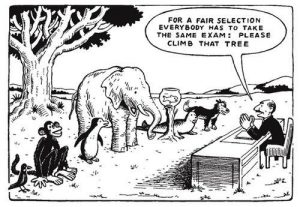“What was on Television when you went to sleep last night?” said my first grade teacher. I was suddenly brought back to the present and tried to think of something to say “uhm… I don’t know.”
“You look tired, I was wondering when you went to sleep last night.”
She had asked me this numerous times before. Truth is I wasn’t watching Television; but I also wasn’t sleeping. I was looked tired because at night I wouldn’t sleep but lay in bed imagining my room was a boat making it’s way across the ocean, and the thought would make me so excited there was no way I could sleep.
While my teacher was concerned about my sleepiness and seeming unwillingness to pay attention, I had no idea why this was a concern. I was too preoccupied with the thoughts and daydreams running through my head.
Fast forward 20 years and here I am in grad school, still making sense of my ADHD diagnosis. Some have said that attention deficit hyperactivity disorder is not really a deficit of attention but a difference of attention. It’s more than just having a difficult time focusing in class, it’s also being able to focus intently on the things that do interest us.
I tell my story because I think I can use it as an anecdote for how we relate to ADHD (or other learning disorders) can help us re-frame our relationship to the disorder. Many people with ADHD, like myself, learn how to cope by learning different ways to relate to the disorder.
For myself, thinking of it not as a deficit, but as a difference in attention has helped me tremendously, and is what led me to social work. Many people have their own ways of articulating their disability, be it through art, dance, writing, sport… for me it was always through books and science. I remember reading that research and theories in evolutionary psychology have suggested that the prevalence of ADHD traits across all cultures could signify that it even had an evolutionary purpose during our species evolution in hunter gatherer societies, and that the symptoms we see today our just an example of how our evolution no longer matches our reality (Browden 2014). It helped me to better see myself not as lacking what everyone else had, but as simply having something that was maybe a little bit different.
I’m not out to to knock modern education per se, but it is to say that as it is, it only caters to a particular learning style.
Learning to relate to my ADHD differently has played an enormous role in my ability to graduate college, learn two new languages, finish Peace Corps and make it through grad school… so far.
In order to do this, however, I have had to rely on creating systems that work for me. Just as each individual has to work to find the methods that work for them. Because I cannot tolerate stimulants well, I have had to rely on CBT based practices and a strict diet and exercise plan. I can say that for me, it helps, but it’s no silver bullet.
Understanding my diagnosis is a work in progress. But believe it or not, I really believe that having ADHD helps me in my work immensely. I think that when I take the time to articulate the experience for myself, and empathize with the experiences of others, it helps me to better recognize the symptoms of learning disabled youth in my practice. It has helped me to better understand that there may be more going on underneath the surface than any of us can realize.
Learning to embrace the various personality traits of ADHD don’t help me as well in the classroom, but they do help me when writing lesson plans on the fly, or facilitating group sessions at my field placement. When talking with people who have ADHD you will find these stories time and time again.
They struggle in one area, but excel in another.
However listening to someone with a learning disability is what is most important. Especially children and adolescents who have not yet understood, or developed a relationship with their learning disability, if they have even been diagnosed. Having the words to go with my own experience was like being thrown a lifesaver while drowning. It helped me escape the feelings of inadequacy that many learning disabled youth feel.
This is why I write this blog, and this is my advice to myself, and to anyone working with youth and adolescents:
Listen first, and be patient. The goal should not be to help them sit still in the classroom, but to understand what it is that may be going on underneath the surface. Those with differences in cognition only need help in finding where it is that they belong, and what it is that they have to give to the world.


